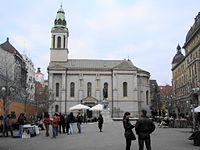Zagreb Orthodox Cathedral
| Serbian Orthodox Cathedral in Zagreb | |
|---|---|
|
Cathedral of the Transfiguration of the Lord |
|

Zagreb Orthodox Cathedral from Petar Preradović Square
|
|
| 45°48′46″N 15°58′26″E / 45.81265°N 15.9739°ECoordinates: 45°48′46″N 15°58′26″E / 45.81265°N 15.9739°E | |
| Location | Zagreb |
| Country | Croatia |
| Denomination | Serbian Orthodox |
| Previous denomination | all Eastern Orthodox communities |
| History | |
| Former name(s) | Church of St. Peter and Paul (in 1794) |
| Founded | |
| Dedication | Transfiguration of the Lord |
| Past bishop(s) |
Metropolitan Emilijan Marinović (1969-1977) |
| Architecture | |
| Status | Church |
| Functional status | Active |
| Heritage designation | Register of Cultural Goods of Croatia |
| Architect(s) | Franjo Klein and Hermann Bollé |
| Style | Historicist interpretation of Romanesque and Byzantine architecture |
| Administration | |
| Archdiocese | Metropolitanate of Zagreb and Ljubljana |
Cathedral of the Transfiguration of the Lord
Храм преображења Господњег
Metropolitan Emilijan Marinović (1969-1977)
Metropolitan Jovan Pavlović 1982-2014
Zagreb Orthodox Cathedral or Cathedral of the Transfiguration of the Lord (Serbian Cyrillic: Храм преображења Господњег, Croatian: Hram preobraženja Gospodnjeg) is a Serbian Orthodox Cathedral located on the Petar Preradović Square in Zagreb, Croatia. It was built in 1865–66 according to designs of architect Franjo Klein. It is ecclessiastically part of the Metropolitanate of Zagreb and Ljubljana and its cathedral.
A wooden Catholic church dedicated to St. Marguerite was located on the place of the modern day cathedral in the 14th century. The church was restored in the 16th and 17th century. Between 1372 and the 19th century, the annual St. Marguerite fair was organized on the square. In the 18th century the church was burned down in a fire and in its place a new one was built with bulbous steeple.
Duding the Josephinism period the state implemented significant reforms that affected life of religious communities. In 1781 Patent of Toleration extended religious freedom to non-Catholic Christians living in Habsburg lands and was followed by 1782 Edict of Tolerance. By city government decision the old church was offered at auction and sold to the Zagreb Orthodox Parish for 4000 Austro-Hungarian forint. In 1848, during Revolutions of 1848, the Orthodox Parish added the suffix Serbian in its name since by that time the Serbs significantly outnumbered local Greeks and Aromanians.
...
Wikipedia

